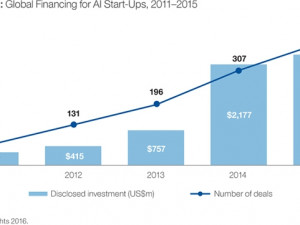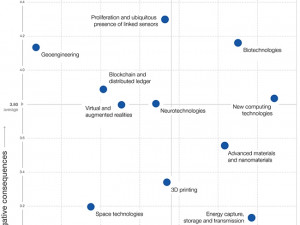
Artificial intelligence (AI) and robotics have the greatest potential benefits, but also the greatest potential negative effects and the greatest need for better governance.
This is according to the World Economic Forum's (WEF's) Global Risks Report 2017, which analysed the risks of 12 emerging technologies.
In this year's annual survey, 750 experts assessed 30 global risks, as well as 13 underlying trends that could amplify them or alter the interconnections between them. Against a backdrop of mounting political disaffection and disruption across the world, one of the key findings was the notion that "society is not keeping pace with technological change".
"Basing their analysis on 12 distinct emerging technologies, experts clearly identified artificial intelligence and robotics as having both the highest potential for negative consequences and also the greatest need for better governance. Notwithstanding its potential to drive economic growth and solve complex challenges, experts also named it as the top driver of economic, geopolitical and technological risks among the 12 technologies," WEF says in a press statement.
"Artificial intelligence has the potential to deliver dramatic benefits in sectors from manufacturing and transportation through to financial services and healthcare. However, increased reliance on AI will create new threats and amplify existing ones, such as cyber and social instability, making the parallel development of risk governance just as crucial," according to John Drzik, president of global risk and specialties at Marsh.
Cecilia Reyes, chief risk officer of the Zurich Insurance Group, says we live in disruptive times where technological progress also creates challenges.
"Without proper governance and re-skilling of workers, technology will eliminate jobs faster than it creates them. Governments can no longer provide historical levels of social protection and an anti-establishment narrative has gained traction, with new political leaders blaming globalisation for society's challenges, creating a vicious cycle in which lower economic growth will only amplify inequality. Cooperation is essential to avoid the further deterioration of government finances and the exacerbation of social unrest," Reyes adds.
Rising investment
The report says myriad opportunities for economic benefit have created a stable flow of investment into AI research and development, but with the opportunities come risks to decision-making, security and governance.
"Increasingly intelligent systems supplanting both blue- and white-collar employees are exposing the fault lines in our economic and social systems, and requiring policy-makers to look for measures that will build resilience to the impact of automation."
The report says that by providing new information and improving decision-making through data-driven strategies, AI could potentially help to solve some of the complex global challenges of the 21st century, from climate change and resource utilisation, to the impact of population growth and healthcare issues.
Start-ups specialising in AI applications received $2.4 billion in venture capital funding globally in 2015 and more than $1.5 billion in the first half of 2016.
"Government programmes and existing technology companies add further billions. Leading players are not just hiring from universities, they are hiring the universities: Amazon, Google and Microsoft have moved to funding professorships and directly acquiring university researchers in the search for competitive advantage," the report reads.

Dangers ahead
However, the authors of the report say potential dangers for AI systems include mismanagement, design vulnerabilities, accidents and unforeseen occurrences.
"These pose serious challenges to ensuring the security and safety of individuals, governments and enterprises. It may be tolerable for a bug to cause an AI mobile phone application to freeze or misunderstand a request, for example, but when an AI weapons system or autonomous navigation system encounters a mistake in a line of code, the results could be lethal."
Machine-learning algorithms can also develop their own biases, depending on the data they analyse, and the report found that AI systems in the cloud are of particular concern because of issues of control and governance.
So far, AI development has occurred in the absence of almost any regulatory environment.
"As AI systems inhabit more technologies in daily life, calls for regulatory guidelines will increase. But can AI systems be sufficiently governed? Such governance would require multiple layers that include ethical standards, normative expectations of AI applications, implementation scenarios, and assessments of responsibility and accountability for actions taken by or on behalf of an autonomous AI system," the report says.
Other key worries identified by the Global Risks Report included climate change, rising income and wealth disparity and increasing polarisation of societies.

Share